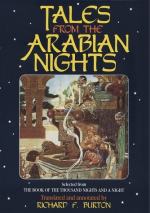“Breeze-waved branch, full moon O’ murk
or sun of undurn sheeny
bright, * Which is she
hight who all the three hath might to
place in pauper plight,
ah!
Where on the bending branch alight with grace of stature
like to
hers * Tho’ be
the branch by Zephyr deckt and in its
ornaments bedight, ah!
And how can fellowed be her brow with fullest moon
that lights
the darks * When sun
must borrow morning light from that
fair forehead dazzling
bright, ah!
Were set in scales the fairest fair and balanced with
a long
compare * heir boasts,
thou haddest over-weight for beauty
and their charms were
light, ah!”
Now when he considered her straitly, she captured the whole of his heart. But the young lady had not upon her clothes enough for concealment, and here and there her body showed bare; so when she came forth and espied the young man standing by the old woman she withdrew into her bower and said to her mother, “Allah requite[FN#121] thee for that thou hast done. How can it be allowed thee by the Almighty to set me in this state before a stranger?” “Hold thy peace,” said her parent; “man is allowed to look, and if he have any art or part in the object looked at ’tis well; but thereafter if he look without its being his lot, then ’twere unlawful. This youth hath gazed upon thee, and if he prove to have a portion in thee let him take it, otherwise he may wend his ways, nor is there a flaw in aught of legal observance.” Hereat the Caliph’s heart was cheered, for he knew that the ancient dame meant to marry the maid. Anon quoth the old mother to the merchant, “Hast thou seen her?” and quoth he, “Yes.” “Did she please thee?” asked the crone, and he answered, “Yea verily,” adding, “How much may be her actual marriage-settlement and her contingent dower?” She replied, “The first shall consist of four thousand dinars and the second shall be the same."’ “This be overmuch,” rejoined the youth, “and more than all my good; to wit, four thousand gold pieces, the gift of which will send me forth to beg; but do thou take of me a thousand dinars, and upon me be the arraying of the house and the maiden’s raiment for another thousand; so will I do business and trade with the remainder.” But the crone sware to him by Allah the Almighty,[FN#122] that an the four thousand failed of a single gold piece he should never see of the damsel a single hair. He replied, “I have no power thereto and—good day to both of you;” and he made for the door, but the Caliph forewent him to the street and standing in a corner suffered him to pass and gang his gait. After this Harun went back to the old woman, and entering salam’d to her and she, returning his salutation, asked him, “What dost thou want and what may be thy wish?” He answered, “The young trader who went forth hence sent me to say that he hath no intent to wed,” and she rejoined, “On this mind the man hied away from us.” Then




